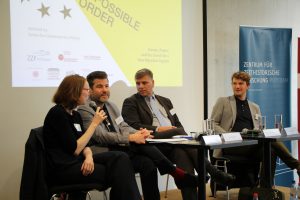
Organized by the Centre for Contemporary History Potsdam in co-operation with numerous esteemed institutions including our very own Bard College Berlin, the three-day conference titled The Impossible Order: Europe, Power, and the Search for a New Migration Regime brought together researchers, artists, historians, academics activists, journalists and students from all over the globe to reflect, act and help resolve current issues facing Europe’s outdated migration structures and discourses. Divided into 7 discussion panels, performances, and an art exhibition, the conference aimed to tackle highly politicized and controversial questions surrounding how Europe’s migration regime is reacting to recent demographic changes and migration movements. The conference challenges the regulation of migration and further complicates the notions of ‘integration’ and diversity by looking at the history behind global migration movements.
Chaired by Dr. Kathrin Kollmeier (ZZF Potsdam), Panel VII on Crafting New Narratives considered how the forms in which migration narratives are verbally (re)produced not only influence the way academics conduct historical research but also how humans, as active cultural agents, conceive of and perpetuate hierarchical social structures and categories of knowledge. The speakers examined the interwoven nature of discourse, politics and identity by tracing discursive labels throughout history and analyzing the views of the employees in the Ausländerbehörden (Immigration Offices), ultimately putting forward a redefinition of ideas of national belongingness, collective identity and inclusion.
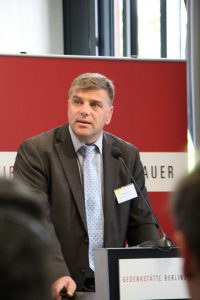
The first speaker, historian and social scientist Dr. Christoph Rass (IMIS, Universität Osnabrück), discussed his current research, “Migration as a Threat: Discursive Configurations at the End of the Cold War.” From a corpus linguistics (a study of language as used in day-to-day discourse) perspective, Rass traced the terminology used to label migrants and refugees in postwar Germany. He pointed out that human beings have always been in motion. In response to that fact, linguistic concepts have developed which turn mobility into migration in order to categorize and organize these movements. (This is something we humans are very prone to do and forms the basis of any sort of science). The prevalence of certain categories throughout history reproduces social attitudes toward migration in communities defined by their spatio-temporal context.
Examining Cold War Germany as an example of the interdependence of discursive conditions, politics and social attitudes, Rass traced the developments in the perceptions of migration up until today. In the 1950s the term Gastarbeiter (guest worker) was used to label the majority of individuals entering the country with a temporary permission to work. No one, not even the workers, thought that they would be staying in Germany permanently. However, the terminology of “guest worker” created a hierarchy between the workforce and their native “hosts” and reflected the sentiment that the workers would only reside in the country so long as the host’s hospitality allowed. Later, migrants were relabeled as Ausländer (foreigners) and were thereby portrayed as different and alien. After Germany’s 1973 Anwerbstopp (recruitment ban), the term Ausländer was frequently used by media and governmental outlets in reference to Germany’s Ausländerproblem (foreigner problem), and, in the process, conceptions of non-belonging extended beyond the labor market to include dialogues surrounding segregation in a socio-cultural context.
Migration movements shifted in the 1970s and 1980s due to the effects the recruitment ban had on foreign labourers: Their short-term stay turned into a permanent one and they facilitated migration of their families to Germany. The attempt to use the 1973 Oil Crisis as a motivation for curbing the foreign population backfired. Thus, the terminology commonly used to categorize migrants changed as well. The phrase Flüchtlingsproblem (refugee problem) was common in public discourse in the period from 1975 to 1982. Furthermore, Asylbewerber (asylum seeker), which emerged after 1975, took on a negative connotation with the term Asylant. The category Wirtschaftsflüchtling (economic refugee) was increasingly used to distinguish those who migrated to Germany for economic reasons and who thus posed a threat to the economic welfare of Germany’s native population from those who fulfilled the “true” qualifications for receiving the “refugee” status. In 1987, the term Scheinasylant (bogus asylum seeker) and Asylbetrüger (asylum-cheaters) became common. These developments reveal a semantic trend in this period that criminalized asylum seekers in Germany.
The Asylkompromiss (Asylum Compromise) of 1992 brought with it rhetorical changes in regard to labeling practices. Higher categories of Ausländer residing within Germany led to well-publicized debates questioning (and denying) Germany’s status as an immigration country. Rass concluded that the current focus in Germany on the securitization of migration — in other words, associating security threats of the nation with migrants and thus politicizing the whole discourse surrounding them — is not a new one, but is rather part of a historic pattern traceable through the evolution of terminology used to label immigrants and migration phenomena.
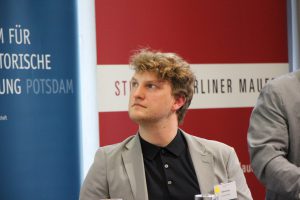
In the next presentation, Dr. Tobias Eule (Universität Bern) also investigated shifts in narratives of migration history in Germany, this time from the perspective of those working in contemporary Ausländerbehörden (Immigration Offices). Using ethnographic data he gathered in 2009 and 2015/2016, Eule analyzed how the agents who decide which individuals receive legal residence status understand Germany’s immigration history.
From this data Eule identified four periods in the immigration officers’ understanding of their institution’s past. Firstly, there was the period of anarchy prior to the 1991 Ausländergesetz (Aliens Act), in which many decisions were left to the largely unguided discretion of the immigration officers. In the 1990s several developments, including the influx of asylum seekers and Spätaussiedler, the 1991 Ausländergesetz, the 1993 Asylkompromiss, and the debates questioning Germany’s status as an immigration country, marked the beginning of the second period of the history of the Ausländerbehörde. During this time, migration law was viewed as a form of “police law” and immigration officers as law enforcement officers. The late 1990s and early 2000s witnessed a period of intermediate struggles for the Ausländerbehörden, but the main reactions to these social and political changes were to enact symbolic reforms and continue operations as usual. Most interestingly, Eule’s return to the field in 2015/2016 revealed a shift in the immigration workers’ fundamental outlook from one of control and restriction to one of enabling residence and “integration.” Most of the interviewees (in the 2015/2016 period) rejected the notion of the Ausländerbehörde as a deportation office, and, while they expressed dissatisfaction, they also acknowledged that the way the offices currently operate is significantly better than in the past. Eule concluded that while institutional change may occur slower than political and legal change, there is a detectable shift in most immigration officers’ understanding of their own functional roles and a hopeful outlook for the future of the Ausländerbehörden as an institution that promotes diversity and inclusion.
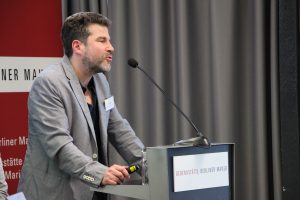
The third and final speaker in Panel VII was Dr. Jan Plamper (Goldsmiths, University of London), whose work primarily focuses on the history of migration and emotions. He opened his speech by stating, “Germany has a problem with narratives (of migration and its history).” While contemporary Germany is marked by a high degree of diversity, the commonly held etho-biological understanding of nationhood demands a form of assimilative integration. In order to “belong,” immigrants are often expected to renounce their cultures, histories, and languages, or, in other words, to become “more German than the Germans.” However, these demands make it almost impossible for migrants and others to fit into the ethnicized national collective identity. Plamper suggests that the way to deconstruct such essentialist national identities is through actor-centered narratives, including historical ones. The narratives should focus on individual migrants’ agency and an effort should be made to emotionalize the stories in order to inspire empathy in the readers and ultimately promote a constructive form of integration that does not demand the erasure of identity.
Plamper also proposed various alternatives to current labels that reinforce ethno-biological notions of nationhood. Firstly, to replace the term Ausländer, Plamper borrowed Naika Foroutan’s concept of Neue Deutsche (New Germans), which refers to German citizens who immigrated or whose parents immigrated. Accordingly, Alte Deutsche (Old Germans) would take the place of labels such as autochthone Deutsche (autochthonous Germans) or Biodeutsche (organic Germans). In order to describe the compositional complexity of contemporary societies, Plamper suggested we adopt Steven Vertovec’s “super-diversity [*1].” Lastly, Plamper argued for a redefinition of the national Leitkultur (guiding culture) in a way that allows or even encourages the existence of particular cultural identity while still possessing a unifying set of characteristics that holds the collective society together. He asserts that, through the dissemination of historical narratives, we must move away from the current assimilative understanding of integration and embrace one in which inclusion and exclusion in pluralistic societies are not defined in ethno-biological terms.
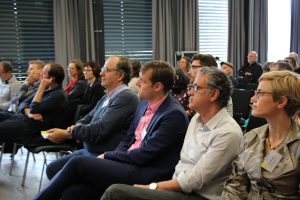
The three presentations incited an impassioned discussion among conference participants regarding the impact of terminology and labeling practices on conceptions of personal and collective identities. While Plamper argued that historical, emotionally charged terms like Leitkultur could be redefined in a positive, inclusive way, most of the audience agreed that new categories would only further essentialize migrants and reinforce static notions of national belonging. Panel VII thus proved to be the perfect end to the conference, tying together the three main themes that emerged in previous discussions: (1) How are “inside” and “outside” understood, and how are these definitions shifting? (2) Which categories are used to define belonging and non-belonging, and what are the implications of these verbalizations for conceptions of identity and migration? (3) How can we achieve a pluralistic, inclusive mode of expression?
The themes discussed and questions raised in Panel VII of The Impossible Order are more important today than ever, and it is our academic as well as humanist duty to not only reflect on them, but to work towards resolving them. The discourse — fraught with power dynamics and the explosive language of an “us” vs. “them” dichotomy — on migration constructs our knowledge of the concepts associated with it. The politicized language used classifies the migrant’s bodies as subordinate and sometimes threatening being in society. If this is not indicative of the power of language and our ability to utilise discourse in a constructive way, then I don’t know what is.
This piece was co-written with Kaitlyn Kennedy (IMIS, Universität Osnabrück).
Notes:
- In the British context Vetrovec observes the current diversity and immigration trends have an unprecedented complexity that he characterises by ‘superdiversity.’ It urges the policy frameworks academic research and public understanding to catch up with the fast paced demographic and social changes.
